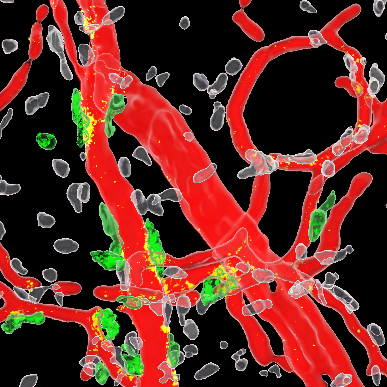Boehme & Dudeck
Tissue-specific roles and mechanisms of intraepithelial mucosal mast cell/epithelial cell interaction in mucosal barrier function in homeostasis and inflammation

Julia D. Boehme
PI
Otto-von-Guericke University Magdeburg
Institute of Medical Microbiology and Hospital Hygiene

Anne Dudeck
PI
Otto-von-Guericke University Magdeburg
Institute for Molecular and Clinical Immunology
Project Summary
Mast cells (MCs) vitally initiate and perpetuate mucosal immune responses towards various exogenous and endogenous stimuli. Intraepithelial mucosal MCs (ieMMCs) constitute a distinct MC subset that uniquely localizes within mucosal epithelial layers, suggesting critical roles of ieMMCs for epithelial cell biology and mucosal immunity in general. Thus far, tissue-specific mechanisms of ieMMCs/epithelial cell (EpC) interaction and their physiological consequences remain elusive. In this project, we therefore aim to determine ieMMC numbers, their exact anatomical localization and organization, and the mechanisms of intraepithelial attachment and cellular interaction with EpC (e.g. physical interaction, MC granules and/or soluble mediators) within different mucosal sites (i.e. gut, lung, urinary bladder) under physiologic conditions and inflammation (Objective 1). To this end, we will use a variety of novel transgenic Mcpt1-based reporter models targeting MMCs and an array of innovative imaging techniques (i.e. whole organ tissue clearing and light sheet microscopy, high-resolution and multiparametric imaging). In particular, we will investigate the heterotypic cell-to-cell-interaction between ieMMCs and EpCs, how these cells influence each other through their interaction and how this interplay changes mechanistically during an inflammatory insult. Further, we will evaluate the tissue-specific roles of ieMMCs for epithelial integrity, adaptation, immunity and tissue regeneration during homeostasis and upon infection and inflammation (Objective 2). Therefore, in vivo models of epithelial injury (influenza pneumonia and C. rodentiuminduced colitis) will be utilized in MMC-deficient mouse models to assess the roles of ieMMCs for lung and gut epithelial function on a single cell level (by assessing phenotypic, functional, transcriptomic, and metabolic adaptations). Complementary analyses of barrier integrity, epithelial shedding, and tissue regeneration and remodeling processes using these models will shed light on ieMMC roles on a tissue level. The aforementioned analyses will be complemented by complex in vitro assays in which MMCs from different mucosal sites will be co-cultured with EpCs, which allows to precisely investigate the mechanisms and relevance of individual interaction factors in detail.


